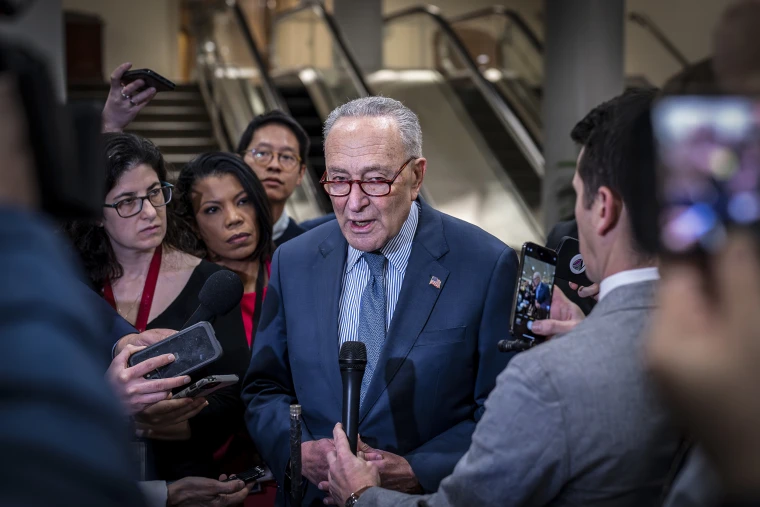Chuck Schumer took steps to conclude the debate on the no-border supplemental spending bill on Friday, inching aid for Ukraine, Israel, and Taiwan closer to approval. The Senate propelled the $95 billion bill forward with a 64-19 vote.
Fourteen Republicans sided with the measure. Senator Bernie Sanders (I-Vt), aligned with Democrats, opposed it, citing concerns regarding aid to Israel.
Currently, the Senate faces a series of weekend votes before reaching final passage. Among these, a pivotal vote on Sunday will attempt to overcome a filibuster on the bill. Senator Rand Paul (R-Ky.) has pledged to oppose a time agreement to expedite progress, necessitating intervals between votes to accommodate debate, as any senator can object to a time agreement.

This not only delays the bill but also diminishes the likelihood of comprehensive votes on amendments, which typically require unanimous agreement among all senators.
Schumer expressed hope for collaboration with Republican counterparts to reach an agreement on amendments, emphasizing Democrats’ willingness to consider reasonable proposals, a practice demonstrated over the past three years.
A previous iteration of the supplemental spending bill, incorporating border spending and policy revisions, faced a Senate blockade earlier in the week. Despite the rejection of that version, numerous Senate Republicans remain steadfast in their stance against further aid to Ukraine without including border policy changes, this time through amendments.
Unless an agreement is reached with Paul, the Senate’s weekend agenda is anticipated to unfold as follows:
Saturday: A day earmarked for debate on the bill.
Sunday: A vote to advance an amendment altering the bill’s text to reflect the language of borderless foreign aid legislation, requiring 60 votes for passage.
Monday: If the aforementioned vote succeeds, the Senate would proceed to vote on approving the amendment, requiring a simple majority. Subsequently, another procedural vote would be taken to advance the bill, necessitating 60 votes.
The final passage vote, requiring a simple majority, could occur either Tuesday or Wednesday.
In a somewhat light-hearted remark, Paul quipped to reporters in the Capitol on Friday night that due to “global warming… hell freezing over is going to be a while.”
Schumer reiterated warnings to Senate Republicans, indicating his intention to keep the Senate in session until the supplemental work is completed. Consequently, this plan will encroach upon both the weekend, including Super Bowl Sunday, and a scheduled two-week recess starting next week. Although members aren’t particularly enthusiastic about this prospect, they are proceeding nonetheless.
“People are accepting it for what it is,” remarked Senator Todd Young (R-Ind.).


